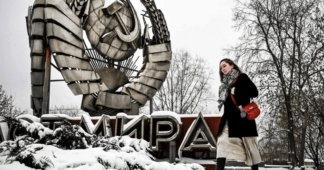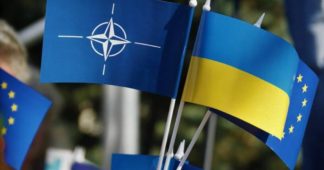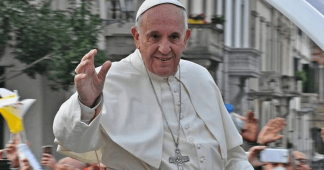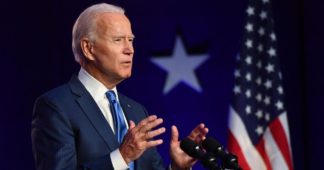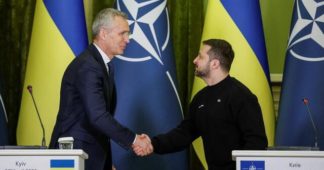How one views the war depends very much on the starting point of one’s analysis
A few words about myself by way of introduction. Until recently, I taught politics at the Université du Québec à Montréal, specializing in the USSR and its former member states. A socialist, I was involved with local comrades in trade union education in Russia, Ukraine and Belarus from the early-1990s and for almost three decades. We defined socialism as the most consistent humanism. The education was profoundly opposed to the policies of the regimes of these states, which were and remain deeply hostile to workers’ interests.
That includes Ukraine, whose successive governments have turned a once relatively prosperous region of the former Soviet Union into Europe’s poorest country. In the 30 years of independence before the present war, Ukraine’s population fell from 52 to 44 million. And of the latter, many were working abroad, in particular Russia.
While elections in Ukraine (at least until the present regime), unlike Russia, can change the composition of the government, they cannot significantly change the antipopular character of its policies. A violent coup in February 2014, authored by ultranationalists and directly supported by the United States, overthrew an elected president. The coup, and the new regime’s first measures directed against Russian-speakers, provoked resistance, and eventually an armed confrontation, in the eastern Donbas region. That civil war, and foreign intervention in it on both sides is a crucial contextual dimension of the present war that is ignored by official NATO sources and the subservient mainstream media (MSM).
How one views the war depends very much on the starting point of one’s analysis. NATO spokespersons and their MSM typically begin from Russia’s invasion. The resulting picture is one of a big, well-armed state that has invaded a smaller one that is bravely defending its territory and sovereignty.
As concerns Moscow’s motives, NATO’s public was informed only that the invasion was “unprovoked.” That word was obligatory in all official and MSM reports of the invasion. As such, it ruled out serious discussion of Russia’s motives. Merely to raise the question was enough to earn one the label of Putin apologist.
By way of explanation, these reports usually offered chosen excerpts, taken out of any context, from Putin’s speeches and texts, such as his statement that the breakup of the Soviet Union was a major geopolitical catastrophe. They failed to mention what followed: anyone who wants to restore the Soviet Union has no brains. At other times, it was argued that Putin felt threatened by the example of Ukrainian democracy just next door—a crude myth, both as concerns the nature of Ukraine’s regime and its attraction for Russians.
What the NATO public certainly never heard was that a clear statement from US President Joe Biden up to the very day of the invasion that Ukraine would not become a member of NATO would in all likelihood have averted the war. NATO’s expansion into Ukraine was the main issue that Moscow raised, as it amassed troops on the border in the months preceding the war and while it repeatedly called on Washington to negotiate an agreement. As late as December 2021, a few weeks before the invasion, Moscow made yet one more formal proposal to the US and NATO to sign a European security treaty and to begin negotiations at once. Like all the previous proposals, it was ignored.
It is possible, of course, that Putin was lying about his desire for an agreement. Maybe he just wanted a justification for swallowing Ukraine. But even so, why not call his bluff and agree to talks, if there was even the slightest chance to avert a war that the American administration had been predicting for months? And the CIA reported that Moscow’s decision to invade was taken only a few days before the order was issued—a clear indication the war might have been avoided if the US and NATO had agreed to start negotiating a European security treaty.
Moscow’s stubborn pursuit of such an agreement is, in fact, quite remarkable, when one considers the long list of provocative US policies in the years before the invasion. The following list is no doubt incomplete:
- US violation of its 1990 promise not to extend NATO beyond united Germany.
- US unilateral exit in 2001 from the Anti-Ballistic Missile Treaty, the cornerstone of nuclear arms control for two decades.
- US direct involvement in Ukraine’s 2014 Maidan coup, the violent overthrow of an elected president, and the immediate recognition by all the NATO states of the putsch government, despite the agreement, brokered earlier by Germany and France, for a provisional coalition government and advanced new elections.
- NATO’s subsequent arming and training of Ukraine’s army, which was engaged in a civil war against a Russia-supported Donbas insurgency that rejected the Maidan coup.
- Failure of the NATO states to enforce the Minsk agreements, negotiated in 2014-15 by France and Germany, for a peaceful termination of the civil war; the former leaders of both countries later admitted they brokered the accords in bad faith only to gain time for arming Kyiv.
- US unilateral exit in 2019 from the Intermediate Nuclear Forces Treaty, accompanied by the installation in Poland and Romania of short-range nuclear-capable missiles only 12 minutes flight-time from Moscow.
- US unilateral termination in 2020 of the Open Skies Treaty that permitted reconnaissance flights to verify compliance and increase mutual trust.
In light of all this, one has to marvel at Moscow’s persistence in pursuing a negotiated agreement. Of course, it is possible that Putin was bluffing, just biding his time. But why, then, did Washington not call his bluff and begin negotiations, if there was even the slightest chance of avoiding war?
The failure of successive US administrations to respond to Moscow’s concerns, which were repeatedly expressed in the years and months before the invasion, and despite direct warnings from a series of top American officials, clearly suggests that Washington wanted this war.
And certainly, once the war began, the American administration, backed by the other NATO states, has done nothing to promote diplomacy and a negotiated settlement that would save lives and precious social and economic infrastructure. The opposite is, in fact, true: the US has consistently blocked, and continues to reject, a diplomatic settlement that would stop the killing and destruction.
Russia’s initial military thrust to the outskirts of Kyiv was not aimed at conquering the capital: the army it sent out was scarcely a third of the size needed for such an operation. Nor did Moscow make use of its crushing air superiority—unlike the US in its criminal war against Iraq—to destroy Ukraine’s civilian infrastructure. Moscow’s goal was to force a diplomatic solution, evidently on terms that it could find satisfactory.
According to former Israeli Prime Minister Naftali Bennett, who took part in the early negotiations between Moscow and Kyiv, a diplomatic solution was indeed shaping up toward the end of March. According to various reports, Ukraine had agreed to a permanently neutral, non-aligned and non-nuclear status, while its security would be guaranteed, in case of an attack, by the permanent members of the United Nations Security Council. For its part, Russia dropped its demand for “denazification,” and Ukraine agreed to restore some official status to the Russian language, which was spoken by over half its population and has been banned from public life by the present government.
There was also some movement toward a compromise over the more difficult issue of the status of the Donbas and Crimea. In Crimea’s case, which Russia clearly will never return (Crimea’s population itself would overwhelmingly oppose such a move), it was agreed to put off a definitive resolution for 15 years.
And so, five weeks into the war, both Kyiv and Moscow were expressing optimism about a possible negotiated ceasefire, something the MSM scarcely managed to notice. But just then, in late March, Biden capped a European trip with a noteworthy speech. As usual, he began by insisting on the unprovoked nature of the invasion. Then, after claiming that Putin’s goal was to build an empire, he declared: “For God’s sake, this man cannot remain in power!” A few days later, the British Prime Minister Boris Johnson made a sudden appearance in Kyiv. Volodymyr Zelensky’s aide informed the press that Johnson had brought a simple message: “Don’t sign any agreement with Putin, who is a war criminal.”
This, not incidentally, occurred just after Russia had removed its troops from around Kyiv, a move widely reported by the MSM as proof that Ukraine could win the war. At the same time, the Ukrainian government announced the discovery of alleged Russian war crimes in the nearby town of Bucha.
That ended negotiations to this day. Moscow has since repeated its willingness to engage in diplomacy, but Kyiv, backed by the US and NATO, continues to declare that it will regain militarily all its former territory. Kyiv went so far as to blacklist Henry Kissinger for calling for a peace settlement that would involve, at least provisionally, a return to the territorial status quo from before the invasion and for Ukrainian neutrality. A Zelensky advisor, insisting that Ukraine could and would win the war and take back all the territory, termed Kissinger’s proposal a “stab in the back of Ukraine.” Someone remarked that when we reach the point when Henry Kissinger becomes a comparative voice of sanity, the situation is dire indeed.
Since the war began, American diplomats have been conspicuously absent from any dialogue with their Russian counterparts. Although there has been some contact between military officials, the top US and Russian diplomats, Antony Blinken and Sergey Lavrov, have not spoken since the war began.
It is widely recognized—and various high-level US officials have stated this openly—that this is a proxy war between the US and Russia, whose goal is to weaken Russia (see, for example, the 2019 RAND Corporation study, Overextending and Unbalancing Russia) and perhaps even overthrow Putin—this in preparation perhaps for a confrontation with China, which Washington sees as a challenger to its unipolar system.
Another US goal in provoking the war, one that has clearly been achieved, was to cement its influence over Europe—to the exclusion of Russia, of course. Despite repeated Russian proposals to create a “common European home,” an idea first advanced by Gorbachev, the US has worked systematically to exclude Russia from any European security arrangement that would replace NATO, an alliance born of the Cold War.
Over the years many top-level US officials, including the current CIA Director William Burns, have clearly warned that that policy aroused the hostility of all Russian governments. That was so even well before Putin became president and when American advisors occupied key positions in the Russian state. But Russia’s hostility was not unwelcome for Washington, since it served as a most useful justification for NATO’s continued existence and expansion. And so it did not take long for NATO to declare that Russia posed an existential threat to its members—the circle was closed.
Another element that must be considered in assigning responsibility for the current war and its consequences is Ukraine’s civil war, with the US and NATO arming and training one side, and Russia supporting the other. This was an active war that began in 2014, soon after the Maidan coup and during which Kyiv, disregarding the Minsk accords that it had signed, refused to negotiate with the insurgents, while neo-fascist military units blockaded the dissident territory and subjected it to intermittent artillery bombardment, including shells that scatter butterfly mines.
In the months before the invasion, Kyiv announced its intention to retake militarily the dissident Donbas territory as well as Crimea and it amassed 120,000 troops, almost half of its army, on the border with the breakaway region. In the days before the invasion, the Organization for Security and Cooperation in Europe’s Special Monitoring Mission reported a major increase in shelling, originating from the Ukrainian side of the ceasefire line. Claiming that Kyiv was planning to invade, Moscow finally recognized the independence of the insurgent regions and signed mutual defense treaties with them.
It is again worth noting the CIA’s report to the effect that the decision to invade was taken only a few days before the order was issued. That would indicate that the invasion was not part of some grand plan to liquidate Ukraine’s sovereignty and swallow up its territory.
At this point the reader is probably asking, “Is this author justifying the invasion?” The UN Charter recognizes only two exceptions to its prohibition on the use of force by one state against another: when its Security Council approves the use of force, or when the state in question has a legitimate claim to self-defense. NATO’s expansion up to Russia’s borders, its arming and training of Ukraine’s army, the US’s abandonment of key arms control treaties, its stationing of nuclear-capable missiles just a few minutes from Moscow—these, in my view, were genuinely and legitimately viewed by Moscow as serious security threats.
Were these threats immediate enough to justify an invasion? I will leave that for the reader to decide. But whatever the answer, next to starting a war, the most condemnable policy is surely to keep the war going when there is no hope that continued fighting will improve the outcome for Ukrainian workers and related popular groups. That is precisely the policy of the US, NATO and Kyiv. Biden stated clearly that he would not pressure the Ukrainian government—in private or public—to make any territorial concessions.
One need not be a military expert to see that there is not the slightest prospect that Ukraine can regain its lost territory, or possibly even avoid losing more, through continued military action, unless, of course, NATO forces directly enter the war—a move that would threaten the world with nuclear Armageddon. This was evident to objective observers from the very first moment of the war, even to the New York Times, which a month into the war admitted that the US goal was to pull Russia into a quagmire.
Continued pursuit of war will bring only more death and destruction to the people of Ukraine. At one point, that was admitted even by the US Chairman of the Joint Chiefs of Staff Mark Milley, who called for a negotiated settlement and was duly instructed to shut up. And if anyone still nurtured illusions, the current Ukrainian “counteroffensive,” whose inevitable failure was obvious to any objective observer, should have finally dispelled them.
However one views Russia’s invasion, to support pursuit of the war by Kyiv until victory, until all lost territory has been regained, and to call for Russia’s strategic defeat—the current position of that regime, supported by the US and NATO—is to support a profoundly criminal policy, since the goal is unrealizable. Its pursuit will not change the outcome of the war but will continue to destroy Ukraine. Territorial compromise is inevitable, if the war is not to go on forever, a prospect that some elements in Washington and Kyiv, in particular the latter’s neo-Nazi elements, who have gained much influence thanks to the war, are apparently prepared to contemplate.
It follows that progressive Canadians, as citizens of a NATO state, should be mobilizing, as they did against Canada’s participation in the US war against Iraq, to press their government for an immediate ceasefire and a negotiated end to the war.
Ultimately, they should press to get Canada out of NATO, a profoundly criminal organization.
* David Mandel is the author of The Petrograd Workers in the Russian Revolution, February 1917-June 1918 (Haymarket, 2018). He is a former professor of political science at Université du Québec à Montréal and a long-time socialist and trade union activist in Canada.
We remind our readers that publication of articles on our site does not mean that we agree with what is written. Our policy is to publish anything which we consider of interest, so as to assist our readers in forming their opinions. Sometimes we even publish articles with which we totally disagree, since we believe it is important for our readers to be informed on as wide a spectrum of views as possible.

